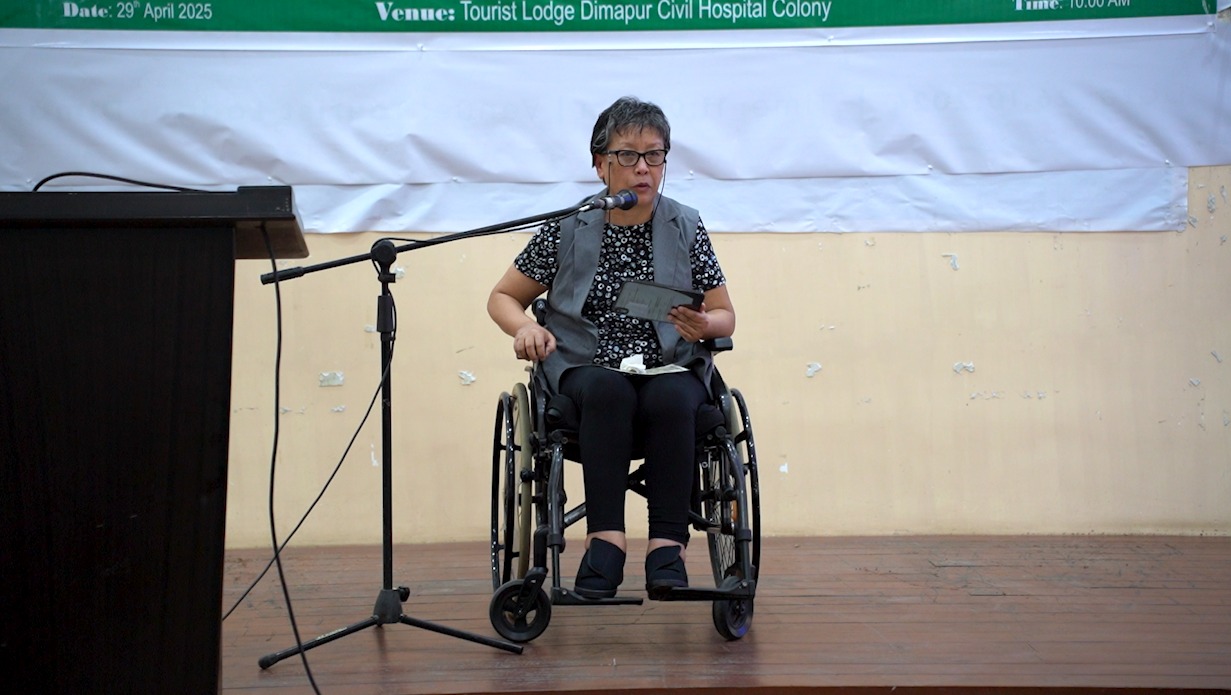SATURDAY, MAY 03, 2025
- Home
- Your disability is not a barrier to leadership – Diethono
Your disability is not a barrier to leadership – Diethono
Published on Apr 29, 2025
By Veroli Zhimo
Share

Diethono Nakhro addressing the workshop at Tourist Lodge in Dimapur on Tuesday. (EM Images)
- DIMAPUR — “Your disability is not a barrier to leadership; it is part of your leadership story and can be your biggest tool.” The statement, delivered by Diethono Nakhro, former State Commissioner for Persons with Disabilities (SCPD), set the tone for a one-day state-level leadership workshop held on Tuesday at the Tourist Lodge, Dimapur.
- Organised by the office of the State Commissioner for Persons with Disabilities (SCPD) and the Nagaland State Disability Forum, the workshop aimed at fostering leadership among persons with disabilities (PwDs) and encourage a shift in public perception from charity-based narratives to one of rights and representation.
- Opening the session, Kushem Yemjong, junior section officer at SCPD office, emphasised the value of visibility, stating that “When people with disabilities see others like them in positions of power and influence; it breaks down the strong mentality that they cannot aspire to those roles.”
Also read: Nagaland government introduces film policy to boost local cinema
- He said such visibility “helps break down social barriers, social stigma and promote a culture of inclusion.” He further emphasised that leaders with disabilities “have first-hand experience of challenges faced by the disabled community” and are thereby equipped to advocate for relevant policies and programmes.
- Calling upon the participants to think deeply about why leadership among PwDs matters — and why it must come from within the community, Diethono Nakhro stated that the first step was to “understand why we are fighting for our rights.”
- She clarified that the fight for rights is not about asking for special treatment but for equal opportunity and access — something that is still largely denied to disabled individuals across areas like education, employment and public spaces.
- Drawing from her personal experience as a wheelchair user, she highlighted how disabled people are often excluded not because of the disability itself but because of social and structural barriers.
- “We can do many things ourselves,” she said adding, “but we are not given accessibility — not given the chance — solely because of our disabilities.”
- Nakhro also addressed the misuse of disability entitlements, cautioning against using quotas or reservations without accountability. While reservation ensures equal opportunity, she emphasised the importance of taking responsibility for one's role once those opportunities are granted.
-
- Rewriting narratives
- A core theme of the workshop was the need to move away from narratives that position PwDs as ‘charity cases.’
- Nakhro asserted that while aid might be needed in some situations, what was more urgently required are long-term structural changes like accessible infrastructure, inclusive education and fair employment policies.
- “When disabled people lead, they can reframe the public conversation around disability from pity or charity to rights, pride and equality,” she asserted.
- Purposeful leadership, she said, must be about more than titles or recognition — it must be driven by clarity of purpose and a desire to make meaningful impact. Recalling her own turning point after an accident that left her disabled, she urged participants to reflect on what mattered to them and to act, even in small ways, within their local communities.
- “Leadership among PwDs is still very poor,” Nakhro said, emphasising that while allies from the non-disabled community play a supportive role and are important, they cannot replace the voice of someone who lives the experience.
- “We have the lived experience. We know best what we are facing in terms of challenges and problems,” she asserted.
- Urging participants to consider what change they want to see, she encouraged them to take small but intentional steps to lead within their own communities. True leadership, she asserted, is not about seeking recognition or titles but about purpose — leading with clarity, vision, and the intent to make a meaningful difference.
- Earlier, the assistant commissioner for PwDs, Zapuno Sophie, stated that the workshop was “planned with the thought that this kind of interactions, discussions could be beneficial” especially for future endeavours.
- “Setting a vision is one way of improving one's life,” she said, adding that proper planning, determination and awareness were essential to achieving such goals.
- “It is with hope that from the workshop of both the sessions, you will come to know more about the government schemes for the PWDs, the RPWD Act and others which will help each of you to have better visions and to achieve more in life,” she said.
- The workshop also included sessions where Khriesinuo Kire, legal consultant at SCPD, gave an overview of disability rights. She also informed that 141 posts have been identified in the state for persons with benchmark disabilities. As per existing policy, 4% of vacancies in each group or grade of post are reserved for this category.
- Akali Sema, assistant director at the Department of Social Welfare, spoke about state and central schemes for persons with disabilities and explained the eligibility and application process.
- The workshop concluded with an interactive session, allowing participants from various districts to raise questions and clarify doubts.

